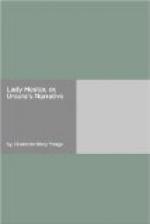I was wrought up, and broke out that he would and should live, and that I would come as a stranger, a nursery governess, and watch over him, and never abandon him to Hester.
“Never fear, Ursula,” said Fulk, “if he lives, he will be in safe hands.”
“Safe hands! What are safe hands for a child like that! Hester’s, who only wishes him out of her way?”
“For shame!” the others said, and I answered that, of course, I did not think Hester meant ill by him, but that, where the doctors had said only love and care could save him—no care was safe where he was not loved; and I cried very, very bitterly, more than I had done even for my father, or for anything else before; and I fell into a storm of passion, at the cruelty of leaving the poor little thing, whom his dying mother had trusted to me, and declared I would never, never do it.
I was right in the main, it seems to me, but unjust and naughty in the way I did it; and when Fulk, with some hesitation, began to talk of my not being asked to go just yet—not while the child lived—I turned round in a really violent, naughty fit, with—“You too, Fulk, I thought you loved your little brother better than that? You only want to be rid of him, and leave him to Hester, and he will die in her hands.”
Fulk began to say that the Court of Chancery never gave the custody to the next heir. But I rushed away again to the nursery, and sat there, devising plans of disguising myself in a close cap and blue spectacles, and coming to offer myself as Lord Trevorsham’s governess.
The child had no relations whatever on his mother’s side, and though, if he had been healthy, nurses and tutors might have taken care of this baby lordship, even that would have been sad enough; and for the feeble little creature, whose life hung on a thread, how was it to be thought of? I fully made up my mind to stay, even if they all went. I told Jaquetta, so—in my vehemence dashed all her bright anticipation, and sent her again in tears to bed. I wish unhappiness would not make one so naughty!
The next day poor Fulk was struck down. A letter came from Mrs. Deerhurst to break off the engagement, and a great parcel containing all the things he had given Emily. She must have packed them up before leaving England, while she was still flattering him. Not a word nor a line was there from Emily herself!—only a supplication from the mother that he would not rend her child’s heart by persisting—just as if she had not encouraged him to go on all this time!
Nothing would serve him but that he must dash over to Paris, to see her and Emily.
Railroads were not, and it was a ten days’ affair at the shortest; and, with all our prospects doubtful and Alured still so ill, it was very trying. How Bertram did rave at the folly and futility of the expedition! but one comfort was, that Alured was a ward of Chancery, and, in the vast kindness and commiseration everyone bestowed upon us, no one tried to hurry us or turn us out.




